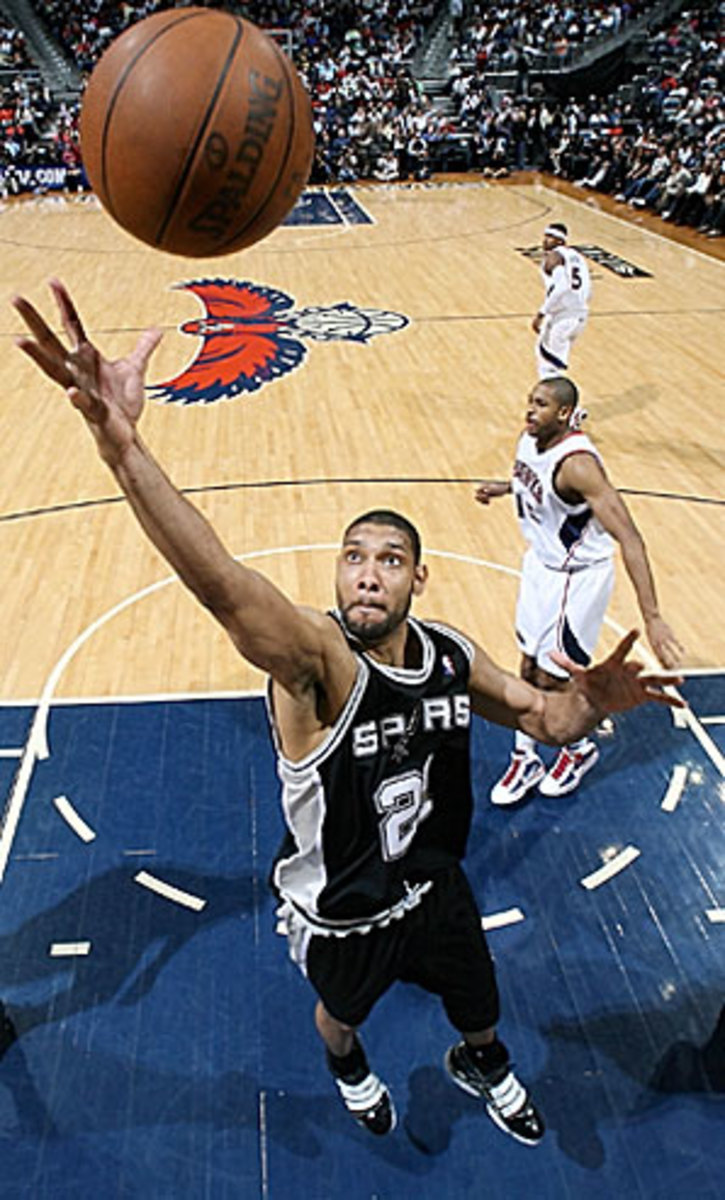Spurs yet to put pieces together
If a picture is worth a thousand words, Tim Duncan's body language said enough to fill a novel. Sitting on a padded folding chair in the visitors' locker room at the Izod Center in New Jersey on Monday, legs splayed in front of him, eyes unfocused and staring at the blue painted wall on the other side of the room, Duncan silently wrestled with the reality that his team had fallen this far. Far, of course, being defined by a loss to the lowly Nets.
"On paper, we seem to be a better team," Duncan sighed. "But we haven't been able to put it together. We've had a crap season so far."
Crap, of course, is a relative term. Crap seasons belong to teams such as the one that beat the Spurs on Monday. The Spurs haven't experience that level of futility since 1996-97, the season before Duncan's arrival. Wednesday's win over Houston was San Antonio's 45th. With eight games to go, 50 victories -- the usual benchmark for a very successful regular season -- is a realistic possibility.
But the Spurs don't measure themselves with the familiar scale. They measure themselves by division titles, of which they have seven in the Duncan era. They measure themselves by conference finals appearances, a number that stands at six in the last 12 years. And they measure themselves by championships. Four times the Spurs have made the NBA Finals since Duncan came on board. Four times they have won it. Since '97, the Spurs have won 69.6 percent of their games, the best winning percentage in professional sports. Not the NBA. Professional sports.
So the Spurs don't see 45 wins. They see eighth place in the Western Conference standings. They see a declining win total for the fourth straight season. They see regression.
Some things have been beyond their control. Age, for one. Duncan turns 34 this month, and with 160 career playoff appearances, he's essentially tacked on two extra seasons to his battered knees. He has managed to stay healthy, thanks in no small part to coach Gregg Popovich's monitoring Duncan's minutes (he is averaging a career-low 31.5 per game). But he is no longer automatic from the low post.
Manu Ginobili has felt the effects of Father Time, too. Lingering ankle injuries limited the 32-year-old Ginobili to 44 games last season. He spent the first half of this season battling a groin injury and these days wakes up wondering if his stiff back is going to allow him to put his pants on.
Tony Parker's age isn't an issue. But being without Parker, 27, for the last three weeks as he recovers from a broken hand -- the former Finals MVP is expected to return for the playoffs -- has certainly affected the Spurs' play.
These are all valid excuses. But as the Spurs know, their issues run deeper. In an attempt to rejuvenate the roster, San Antonio dumped former mainstays Bruce Bowen, Fabricio Oberto and Jacque Vaughn and imported seven new players, including two starters in Richard Jefferson and Antonio McDyess. The infusion of new blood brought unfamiliarity. Unflinching faith was replaced with mistrust.
"It took a lot longer than usual to get them acclimated and to get them to feel comfortable in the system," Popovich said. "It was tough. Some guys deferred for too long or too much. Other guys picked things up quicker than some. It was always kind of a mish-mosh. It was difficult to get that trust going. It's a real mercurial thing. You've got to really gain that during games. Five people have to react a certain way. It took significantly longer than usual to get everybody to trust each other in a variety of situations, especially in fourth quarters."
The Spurs' defense has come under the most scrutiny. San Antonio has finished in the top five in points allowed per 100 possessions every season with Duncan. But this year they have slipped to ninth, giving up 104.5 points per 100 possessions. But the offense has suffered, too. The numbers are misleading: San Antonio is seventh in field-goal percentage and has the league's most productive bench, leading in points (39.4), rebounds (17.5) and assists (8.8) through Tuesday. But scouts say the Spurs' playbook has been chopped in half, a byproduct of working in so many new players. The patient read-and-react system has been stripped down, replaced by a steady diet of bland pick-and-rolls and post-ups.
The pieces don't fit. The Spurs don't run (they rank 23rd in pace) and have point guards who don't like to pass in transition, anyway. Parker's average of 5.7 assists puts him in the Tyreke Evans/Stephen Curry class, and though George Hill has sparked the Spurs with his scoring, he is averaging only 3.6 assists in 35.4 minutes as a starter. This has dampened the impact of Jefferson, who is at his best when filling the lanes on the break. Meanwhile, McDyess hasn't formed as successful a partnership with Duncan as David Robinson, Nazr Mohammed, Rasho Nesterovic and Oberto did during San Antonio's championship seasons.
Hill, McDyess and Roger Mason are solid role players, but consider this: Are they better than Bowen, Oberto, Robert Horry and Michael Finley were three years ago?
If we are witnessing the demise of San Antonio, it won't be for long. The Spurs have a stud in center Tiago Splitter sharpening his game overseas, and Popovich and general manager R.C. Buford operate the best front office in the league. They will be back. But all dynasties come to an end sometime and this could be the end of the road for theirs.






